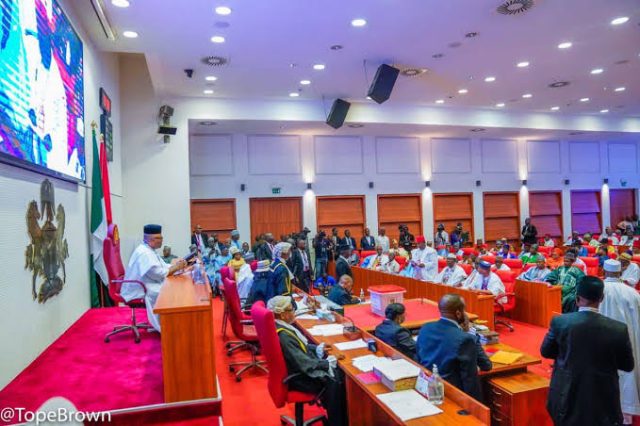Despite widespread support, Sen. Olalere, expressed concerns about the bill’s feasibility, especially in sectors lacking the capacity for local processing.

The senate has passed for second reading, a bill seeking to mandate the domestic processing of at least 30 percent of raw materials before export.
This development came during Tuesday’s plenary session, following the presentation of a proposed amendment to the Raw Materials Research and Development Council Act, aimed at promoting local production and value addition.
Leading the debate, Sen. Peter Nwebonyi (APC, Ebonyi north) emphasised the bill’s potential to transform Nigeria’s economy. He argued that mandating local processing would strengthen domestic manufacturing, generate employment opportunities, reduce import dependency, and ease the pressure on foreign exchange.
“Promoting local processing to a minimum of 30 percent or more will add value to our economy, particularly to our naira. It will also encourage innovation within our local industries, leading to a significant increase in domestic production,” he said.
He further argued that the bill, if enacted, would protect Nigerian manufacturers from foreign competition by regulating the importation of raw materials that could be processed locally, creating a supportive environment for domestic industries to flourish.
READ ALSO: Stop exporting unprocessed natural resources – House of Reps
Despite widespread support, the deputy minority leader, Sen. Oyewumi Olalere, expressed concerns about the bill’s feasibility, especially in sectors lacking the capacity for local processing.
He cautioned that stringent enforcement could adversely affect farmers who rely on export markets for their raw materials.
“There is a need for amendments due to the nature of some products. We assume that all these products should not be exported raw, but what about when there are no companies to process them locally?
“We should avoid granting blanket approval, as farmers may incur losses if raw materials cannot be processed locally,” he said.
Following extensive deliberations, the President of the Senate, Godswill Akpabio put the bill to a voice vote with a majority of lawmakers voting in favor that the bill be passed for second reading.
The bill was thereafter referred to the committee on science and technology to report back in 6 weeks.
STAR Check: Nigerians, particularly, constituents of Ebonyi North district, can keep tabs on the legislative performance of Sen. Nwebonyi throughout the 10th senate here.


